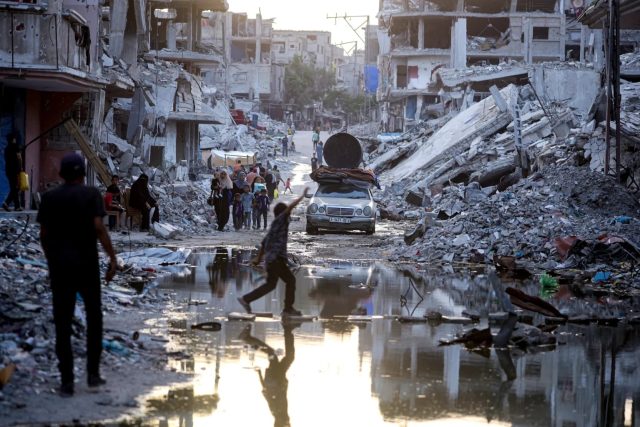UNITED NATIONS, Wednesday, April 23, 2025 (WNP): Displaced families in southern Gaza are facing a deepening public health catastrophe amid scorching heat, raw sewage, and mounting piles of uncollected trash, as humanitarian aid remains blocked and medical supplies dwindle, the United Nations warned on Wednesday.
In the coastal encampments of Al Mawasi, where thousands of families have taken refuge in makeshift shelters, conditions are becoming increasingly perilous. Louise Wateridge, Senior Emergency Officer at the UN Relief and Works Agency for Palestine Refugees (UNRWA), described the situation as “desperate,” with malnourished children and families struggling against relentless heat, unsanitary surroundings, and limited access to clean water or medical care.
“The trash is just out of control,” Wateridge told UN News. “The sewage, the rodents, the pests, the rats, the mice – all of these are moving through the shelters where people are trying to live. Disease is spreading fast, and there’s not enough medicine.”
Despite ongoing clean-up efforts, UNRWA’s resources are running dangerously low. Wateridge warned that the agency has only about 10 days’ worth of pesticides remaining, threatening to worsen the sanitation crisis.
The situation has been further exacerbated by the destruction of essential public health infrastructure. According to the UN Office for the Coordination of Humanitarian Affairs (OCHA), Israeli airstrikes between April 21 and 22 destroyed more than 30 vehicles used for waste disposal, water delivery, and sewage maintenance.
OCHA also reported that at least 23 airstrikes over the past week have struck tents sheltering internally displaced persons (IDPs), killing dozens of civilians, including women, children, and persons with disabilities.
Gaza’s health system, already on the brink of collapse, is now barely functional. Over half of the remaining healthcare facilities are located in areas under evacuation orders, severely limiting access for thousands of people in urgent need. Shortages of medicine, medical equipment, and trained personnel persist across the enclave.
As of April 15, an estimated 420,000 Palestinians have been displaced — many for the second or third time since the conflict escalated.
OCHA reported that the humanitarian space remains virtually shut down. No aid convoys have entered Gaza for 52 consecutive days, and nearly half of planned aid missions between April 15 and 21 were either denied or obstructed. Out of 42 missions coordinated with Israeli authorities, 20 were denied, two were impeded, 19 were facilitated, and one was cancelled.
Meanwhile, the funding gap remains critical. As of April 22, only $569 million — just 14 percent — of the $4.07 billion required to meet urgent humanitarian needs in Gaza, the West Bank, and East Jerusalem has been disbursed by donors, OCHA said.
UN officials continue to urge the international community to act swiftly to prevent further loss of life and to ensure humanitarian access to Gaza’s besieged population.




